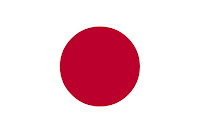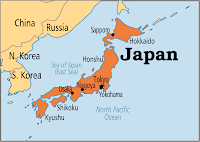Japan is an island nation in East Asia. Located in the Pacific Ocean, it lies to the east of the Sea of Japan, China, North Korea, South Korea and Russia, stretching from the Sea of Okhotsk in the north to the East China Sea and Taiwan in the south. The characters that make up Japan's name mean "sun-origin", which is why Japan is sometimes referred to as the "Land of the Rising Sun".
Japan is an archipelago of 6,852 islands. The four largest islands are Honshu, Hokkaido, Kyushu and Shikoku. Together, these four islands hold about 97 percent of Japan's land area. Japan has the world's tenth-largest population, with more than 126 million people. Honshū's Greater Tokyo Area, includes the de facto capital city of Tokyo and several surrounding prefectures. It is the largest metropolitan area in the world, with more than 30 million residents.

Periodic insurrections and civil disturbances continued into the 1880s. A modern constitution was promulgated in 1889 and a Western-style parliamentestablished. In the late 19th and early 20th centuries, victories in the First Sino-Japanese War, the Russo-Japanese War and World War I allowed Japan to expand its empire during a period of increasing militarism. From 1931, military expansion into China and Manchuria led to the Second Sino-Japanese War in 1937. Japan allied itself with the Axis powers in 1940, and the war in China became part of World War II in 1941. Successive military defeats and the atomic bombings of Hiroshima and Nagasaki led to the end of the war in 1945, Japan's surrender and the loss of its empire. Under Allied military occupation lasting until 1952, Japan dissolved and restructured its military, adopted a revised constitution in 1947 and became a unitary constitutional monarchy with an emperor and a democratically elected legislature.
 A major economic power, Japan has the world's third-largest economy by nominal GDP and the world's fourth-largest economy by purchasing power parity. It is also the world's fourth-largest exporter and fourth-largest importer. Although Japan has officially renounced its right to declare war, it maintains a modern military with the fifth largest military budget,[10] used for self-defense and peacekeeping roles. According to Japan's health ministry, Japanese women have the second highest life expectancy of any country in the world. According to the United Nations, Japan also has the third lowest infant mortality rate.
A major economic power, Japan has the world's third-largest economy by nominal GDP and the world's fourth-largest economy by purchasing power parity. It is also the world's fourth-largest exporter and fourth-largest importer. Although Japan has officially renounced its right to declare war, it maintains a modern military with the fifth largest military budget,[10] used for self-defense and peacekeeping roles. According to Japan's health ministry, Japanese women have the second highest life expectancy of any country in the world. According to the United Nations, Japan also has the third lowest infant mortality rate.
Recibe las novedades en tu correo
